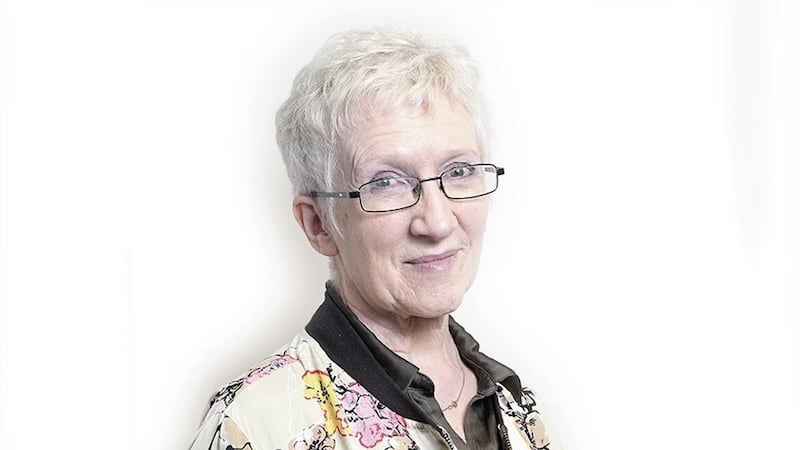SHE’S a rock star, said the broadcaster asking skilled and self-effacing questions, and Louise Kennedy indeed has charisma.
You might well know that some writers have personal magnetism and still be surprised by it.
The lasting surprise is the wave of smashing women writers crashing into the northern corner of Ireland, the plenty and talent of them well up to the rest of the island.
Kennedy is an acute and funny speaker, warm though not cosy, as well as a lovely writer.
From the age of around three she’d been sat on a bar stool, she said, magnetised by the Babycham Bambi behind the counter, wanted Babycham when asked what she’d like to drink, would still like that Bambi and a teak stool but her mother won’t give them up. (The pub was bombed. Trespasses, through two of its main characters, lives partly in a pub.)
Judging by the applause before Kennedy spoke in the Black Box last Wednesday, many appeared to know her form already. Mostly women?
Her novel Trespasses is set in 1975 when she was eight. It was too dark to make notes; I think the pre-publication anxieties she admitted were that friends and family would say she’d got the Troubles wrong. I think she added that she fretted those close to her might object to how she’d written aspects of them into fiction.
She need not have worried. Neither happened, though she had us laughing about a sister and brother-in-law commenting darkly on a story in a prize-winning collection (set in today’s Ireland) published before the novel.
Rave reviews – and the prospect of a film version since the book has been ‘optioned’, she said with fingers audibly crossed – may have swamped any jibbing. Plus straightforward pleasure for her, welcome for her own straightforwardness.
Why did the young woman at the centre of Trespasses have no women friends? Originally she did but an editor Kennedy revered (did a great job on her accent too) ‘killed her’.
Authors praising editors often sound pious. This didn’t, nor appreciation for a lecturer in the Heaney Centre, kindness from someone in Belfast magazine Tangerine, encouragement from Dublin’s Stinging Fly.
Newly-celebrated talent isn’t exclusively female, obviously, and this is not the first sight of the wave. But it’s recent for me, after decades of refusal to absorb more than a few impressions.
Troubles literature, bah, wouldn’t have it about me, hard enough writing about the stuff, too much to read it as well. What felt like self-preservation became unexamined habit.
This was stupid. Wasted time, as the man said, and now doth time waste me. No matter how badly written, what I would have read would almost certainly have been at least a re-imagining.
For some physical distance, and time, are said to be necessary to turn experience into fiction.
Now in her fifties, Kennedy has made several shifts; Ardoyne roots on one side, the family pub in Holywood, then Naas (‘horse-s*** tramped into the street’, society very different ‘Catholic’), Sligo and cooking in a restaurant that struggled, children. Plus local writing group, ‘dragged by my friend Niamh’, cancer treatment, studying creative writing.
Writers of fiction set in the worst years (or incubated then) have perhaps needed until now to let fiddly memories sift themselves.
The people who say they cannot or will not read fiction are probably beyond reach. Because time has passed it should surely be worth their time to have a look.
New Year, New Ventures; don’t let’s label it a resolution. Hearts lift when you can read or be read to.
With politics in an airless room and less sense emerging by the minute, as happens when oxygen fails, looking out and around with imagination is not just blessed relief. It might stretch your memory. It could give you new wind.
(The Out to Lunch Festival continues until January 29. Events in the Black Box give you lunch with your ticket. )








